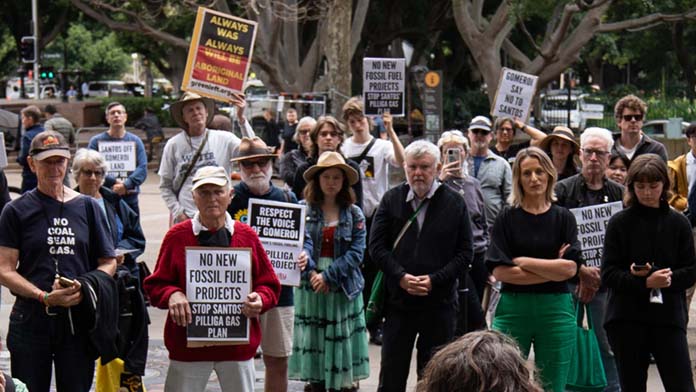Gomeroi people have won a stunning legal victory over gas giant Santos. On 6 March, the Federal Court upheld an appeal made by Gomeroi against a Native Title Tribunal (NTT) ruling from December 2022.
The NTT had granted Santos permission to proceed with the Pilliga-Narrabri gas project and drill 850 coal seam gas wells in the Pilliga state forest in north-west NSW without Gomeroi consent.
This successful appeal revokes that permission, forcing Santos back to the negotiating table at a time when the company has already faced lengthy delays to its drilling timeline, potentially making the project unviable.
Justice Dowsett at the NTT had refused to accept that the Santos project would have any impact on the climate and said he was not obliged to consider climate impacts. The Federal Court judges ruled that Dowsett was wrong.
Real victories in the Native Title system are rare. It is a racist system that denies Aboriginal people any real control over development on their lands, providing only a “right to negotiate” on benefits resulting from developments.
If Aboriginal people refuse a deal—as the Gomeroi have refused Santos—companies can run to the NTT and get permission to proceed regardless. But they first need to demonstrate that their project is in “the public interest”.
Racist system
The Pilliga is the largest inland forest remaining on the continent, with many endangered species and deep spiritual significance for Gomeroi people.
Gomeroi have a Native Title claim registered over the forest and have played a leading role in fighting Santos’s gas plans for more than a decade.
In 2021, Santos lodged four applications with the NTT covering the area of the proposed gas-field, seeking permission to over-ride Gomeroi rights and start drilling.
Historically, the NTT has considered virtually all resource projects to be in the public interest, citing the importance of mining to the Australian economy.
There have only been three NTT rulings in favour of Aboriginal people trying to stop unwanted projects and 149 decisions in favour of developers.
Santos put a final offer to a major Gomeroi Native Title meeting in March 2022. Gomeroi people knew that if they refused a deal, Santos would likely win in the Tribunal and they could receive no compensation at all.
Despite this, in an inspiring display of unity and commitment to fight for their lands, Gomeroi voted 162-2 against any deal with Santos.
Black rights and climate justice
In the NTT, Gomeroi were subjected to consistent, racist denial of the importance of their connection to the Pilliga and their rights over the forest.
The Federal Court found no fault in most of Dowsett’s judgement. However, the fact that Dowsett acted like a blatant climate denier during the hearing brought his judgement undone.
Gomeroi had made a strident argument that the risks posed by climate change meant that the project could not be considered in the public interest.
This was the first time a Native Title group had ever made such an argument. It reflected the fact that Gomeroi have built strong links with the climate movement over many years, and major climate demonstrations in Sydney and elsewhere have championed opposition to the Pilliga project.
Dowsett was contemptuous, attacking the credibility of expert witness Professor Will Steffen and the UN Intergovernmental Panel on Climate Change on which Steffen had served. He insisted the Tribunal had no business considering climate impacts when assessing “public interest”.
But a groundswell of climate activism over many years has made the issue one that courts can’t simply ignore.
Dowsett was found to be mistaken—the Federal Court made a clear ruling that the NTT is indeed obliged to consider climate impact as part of the “public interest” test.
This victory shows the power of ensuring that Black justice is at the heart of the climate fight. This fight must continue—Gomeroi need control over the Pilliga.
Since 2021, there has been significant solidarity developed with unions. Unions NSW has taken a stand against a fossil fuel project for the first time, supporting delegations to the Pilliga and pledging action. These networks should now demand Labor kill off Santos’s plans for good.
Santos will most likely return to the NTT, arguing that even when considering climate impacts, profits should still win out. They are continuing operations in the forest, preparing for when they get permission for mass expansion.
But the Black rights, climate and trade union movements acting together hold the power to defeat fossil fuels and win real land rights.
By Paddy Gibson






